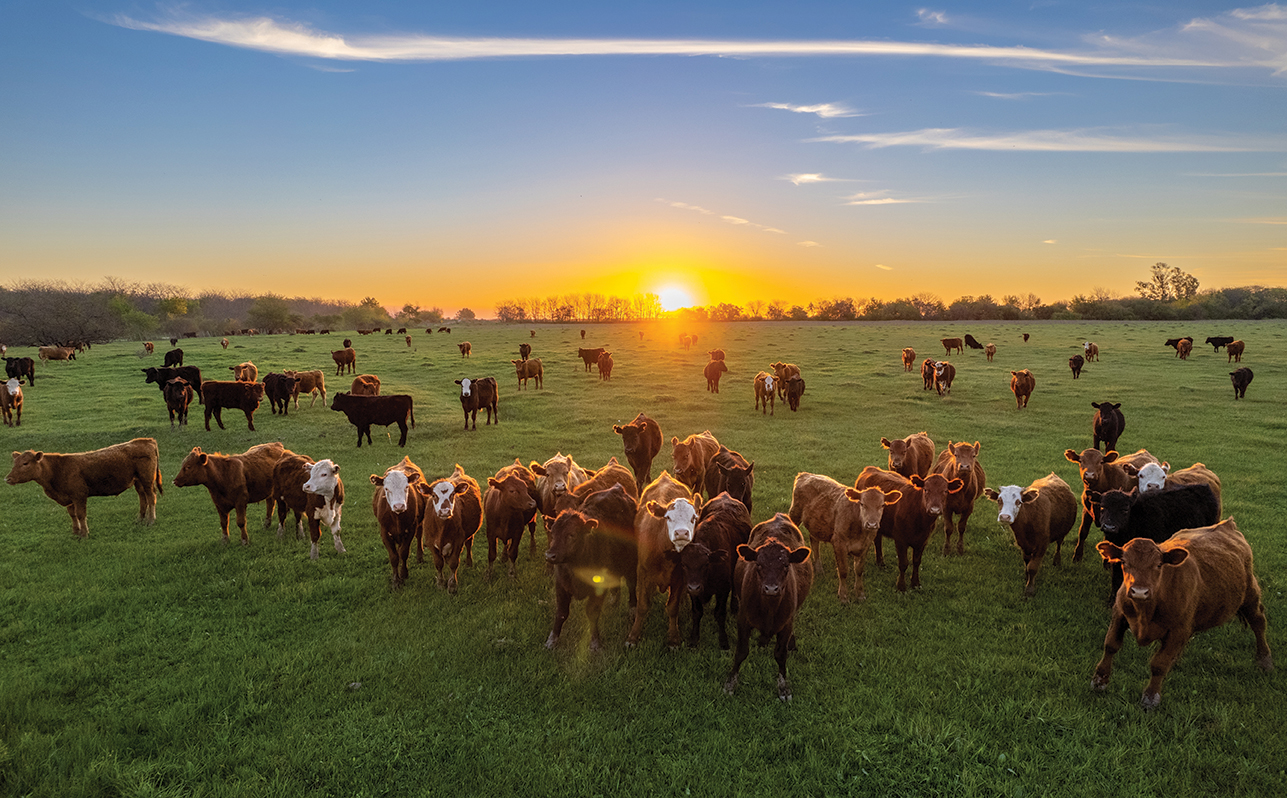
10 Tips to Bulletproof Your Beef Operation
February 26, 2024
Written By Linda Geist
Beef producers can use a window of profitability to make their farm business more bulletproof. University of Missouri Extension agricultural economist Joe Horner said successful beef producers can make small changes in three areas to make their farm less vulnerable to risks: plants, animals and business. Being good in just one of those three areas is not enough.
Longtime producers see the big picture and plan to withstand cycles in the industry. Drought is a recurring theme for Missouri farmers, Horner said. Producers should not look at drought as an emergency. “Drought is going to happen. Build a standard operating procedure on your farm to manage it,” he advised. “Prepare yourself to glide through it.”
One safeguard against drought is to invest one time in making or buying 50% more hay than you normally need. Carry that hay inventory over every year. That becomes a strategy to keep drought from forcing you to buy hay or sell cattle in a drought.
A 50% hay cushion you can rotate through every year comes as a one-time investment that is tax-deductible. With high calf prices projected for 2024, farmers will be looking for deductions.
Younger farmers are looking at interest rates they’ve never seen in their lifetimes, Horner said. Since the great recession in 2008, lending rates were artificially low until this year. Normal times have returned. Older producers have seen these high-interest cycles before and will manage differently than younger producers. Managing cash and reducing debt becomes more important, Horner said.
Livestock producers are now 10 years into a 10-year cycle, he said. Cow inventories are tight. Feeder calves available to feed will get tighter as higher prices encourage people to keep more heifers on-farm. Economists are forecasting good prices ahead. “2024 will be as good as any time we’ve seen since 2014,” he said, with producers holding back heifers. “Periods like the next two to three years only happen a few times in a 50-year farming career.”
Horner predicted that these higher margins will lead farmers to look for tax deductions. Rather than buying a new pickup or farm equipment, Horner recommended that producers first invest in a Top 10 list to make their farm business more profitable and resilient when the cattle cycle inevitably turns with lower prices.
TEN TIPS TO INCREASE PROFITS FOR BEEF PRODUCERS
1. Have a separate bull pasture. A defined breeding season reduces odd lots at the sale barn. Lots of like calves sell at higher prices. Batch calving is easier to manage.
2. Follow your veterinarian’s advice. Follow vaccination schedules and test for bull soundness. “Veterinarians create value on your farm because of what they know. Pick your vet’s brain and follow their suggested protocol,” Horner said.
3. Invest in good cattle handling facilities. Properly designed and maintained handling facilities make cattle working easier. Easy jobs get done, and good facilities lead to fewer injuries. “You can’t put a price on your family’s safety,” Horner said.
4. Invest in good fences for weaning. Bawling calves bring less money at the sale barn, so do the extra work. Wean calves before selling. Buyers pay more for weaned calves.
5. Carry 50% extra hay inventory. Add 50% more hay stock once and rotate out hay yearly. The carrying cost is a good investment. “That’s your drought insurance, and it is easier than finding hay, and it makes life less stressful,” Horner said.
6. Do soil tests. A soil test will tell you if you need to add nutrients to boost yields. Lime is a cheap, undervalued nutrient.
7. Convert some pastures to native warm-season grasses. Warm-season grasses make your operation more drought-resilient, need less fertilizer, boost summer calf gains and can improve herd reproduction performance. State and federal incentives are available to plant natives.
8. Convert to rotational grazing. Rotational grazing systems make managing cattle and forages easier. A system allows producers to mitigate drought, improve soil health, increase forage production and extend the grazing period. Contact the Missouri Center for Regenerative Agriculture at [email protected] for more information on federal cost-share funds for rotational grazing.
9. Understand risk insurance programs. Study the MU Extension publications “Pasture, Rangeland, Forage (PRF) Insurance in Missouri” and “Livestock Risk Protection (LRP) Insurance,” and work with a trusted insurance agent. PRF insures against drought. LRP insures against low prices.
10. Seek the advice of a farm tax preparer. The IRS has new resources to measure compliance. Talk to your tax preparer to make sure your farm is bulletproof. Comply with reporting rules for contractors and laborers who need to receive 1099 or W-2 forms.


